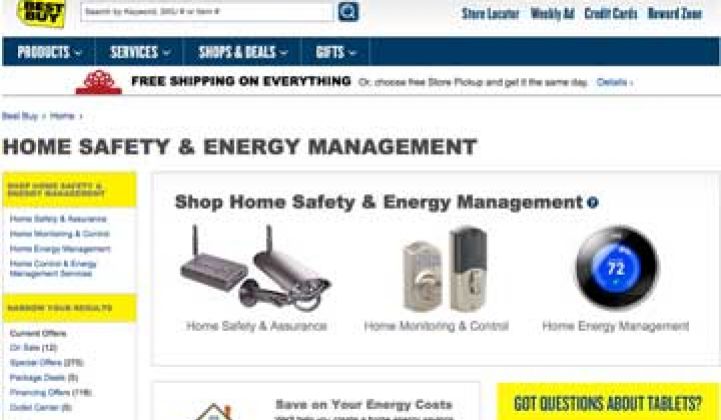It seems as though it was just the other day Greentech Media was lamenting that big-box stores weren’t pushing Energy Awareness Month (which has now passed; sorry, folks).
As it turns out, Best Buy has had a home energy-efficiency push in the works for some time. On Friday, the retailer announced it has three pilot stores ready to test home energy concepts through an experimental learning center that includes an online self-assessment platform.
The platform was built by Energy Results, a Chicago-based company that offers the software platform on its website to help homeowners, and even renters, understand the best energy efficiency measures for them and then how to take action. The in-store pilots come on the heels of other cleantech moves by Best Buy, including selling electric bikes and moving toward selling electric vehicle charging stations.
The stores in Chicago, Houston and San Francisco will allow customers to learn more about energy efficiency upgrades, from Energy Star appliances to monitoring devices, that could help them save energy. Of course, Best Buy is then hoping buyers will make those purchases with them instead of taking the information to Home Depot or Sears.
“We think energy management and energy efficiency is just over the horizon,” Brian Dunn, CEO of Best Buy, said at the company’s Energy Efficiency Summit 2011 in late August to an audience of utilities and smart grid vendors. “We believe we’re the only folks actively wiring people into the answer, and we think that’s really important.“
To move customers to the answer of an efficient, connected home, Best Buy will first have to let shoppers know that it is the trusted source in this emerging space -- and not just for cell phones, DVD players and computers.
For customers who do not live in one of the three pilot locales, there is an online portal that can recommend upgrades for the entire house or just offer suggestions for a single item.
Energy Results is enthusiastic about finding a partner with such a large reach that shares their philosophy. “We really feel like informing customers is only half the battle, if that. You need to bridge the information piece with the action piece,” said James Carlin, COO of Energy Results. Best Buy is “uniquely positioned to push the market in this direction,” in Carlin's view.
This is not Best Buy’s first foray into efficiency. The store already carries various Energy Star products and offers product recycling, and some locations have Green Zones, which carry efficient products. But they're hardly alone. Home Depot, Lowe's and Sears also have Energy Star appliances and Lowe's is selling residential solar.
But this will be much more than just buying a smart refrigerator. If the pilot stores are successful, this initiative could grow into a nationwide campaign with additional product offerings down the road, such as LEDs and weather stripping, products that have traditionally been outside of the tech retailer’s wheelhouse. Dunn said he sees energy management as an extension of the company’s core competency.
For consumers who want more than some CFLs and a fourth Energy Star LCD TV for their house, whole-home energy audits are available in the three cities. Best Buy will have a network of service professionals to perform energy audits and then carry out upgrades. In the EV space, Best Buy is also offering Geek Squad garage site surveys for potential EV owners. Eventually, there will likely be a full-fledged Geek Squad just for home energy.
“Homeowners don’t really have one person to turn to educate them about renewable energy or energy efficiency and then to help them take action,” said Carlin. “It’s often several people you have to call.”
The partnership will not preclude Energy Results from selling direct to consumers, as it has been. The firm will also continue to look for partners that can offer its software as service, whether that’s retailers, utilities or local governments.
Carlin said he hopes to see utilities embrace this platform as a way to reach out to their customers with energy efficiency rebates and other programs. Currently, the offerings are still limited on Best Buy’s website (under the Products tab, go to 'Home' and then to 'Home Safety & Energy Management') in the area of wireless smart thermostats and home energy management systems. If the pilots are successful, however, there should be many more products added to the mix, given the multitude of home energy management companies with products in utility pilots. General Electric, for instance, has said it will start market-testing its home energy management system in stores in 2012. Best Buy does carry the sleek, expensive Nest Labs thermostat on its website, although the product is reportedly sold out until 2012.
Best Buy is also practicing what it preaches. Last week, it announced it will implement new energy management systems in its U.S. stores that will cut energy costs and carbon by 15 percent within three years. At the 2011 Advanced Research Projects Agency-Energy Innovation Summit, a Best Buy executive even floated the idea that Best Buy may someday sell electric vehicles.
For now, Best Buy has its work cut out for it. Buying weather stripping and home monitoring equipment lacks the sex appeal of a 60-inch flat-screen TV. But with the brisk sales of the Nest Labs thermostat, that may be changing. “We believe firmly and passionately that Best Buy exists because we’ve done one thing,” said Dunn. “We’ve ridden with the customer and helped them with the technological changes that are coming at them rapidly.”



